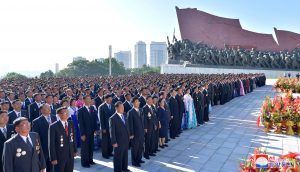By Josh Smith
PYONGYANG (Reuters) – With no long-range missiles on display, North Korea staged a military parade on Sunday focused on conventional arms, peace and economic development as it marked the 70th anniversary of the country’s founding.
The reduced display compared to past years earned a thank you note from U.S. President Donald Trump, who hailed it as a “big and very positive statement from North Korea.”
Trump on Twitter quoted a Fox News description of the event without long-range nuclear missiles as a sign of North Korea’s “commitment to denuclearize.”
“Thank you To Chairman Kim. We will both prove everyone wrong! There is nothing like good dialogue from two people that like each other! Much better than before I took office,” Trump tweeted.
In Pyongyang, line upon line of goose-stepping soldiers and columns of tanks shook the ground before giving way to chanting crowds waving flags and flowers as they passed a review stand where North Korean leader Kim Jong Un sat with a special envoy from China, as well as other visiting foreigners.
Kim told the envoy, Chinese parliament chief Li Zhanshu, that North Korea was focusing on economic development and hopes to learn from China’s experience in this regard, Chinese state television reported.

Attendees during the 70th anniversary of North Korea’s foundation, in this undated photo released on September 9, 2018 by North Korea’s Korean Central News Agency (KCNA). KCNA/via REUTERS
“North Korea upholds the consensus of the Singapore meeting between the leaders of North Korea and the United States and has taken steps for it and hopes the United States takes corresponding steps, to jointly promote the political resolution process for the peninsula issue,” the report paraphrased Kim as saying.
The parade highlight themes of military accomplishment, national development, and international engagement at a time when doubts are arising over Kim’s commitment to abandoning nuclear weapons.
Unlike in previous years, there were no inter-continental missiles on display. And there were no nuclear tests to mark the holiday, as has happened in each of the last two years.
North Korea routinely uses major holidays to showcase its military capabilities and the latest developments in missile technology.
But that has lessened this year, underlining Kim’s stated aim for denuclearizing the Korean peninsula and his recent meetings with South Korean President Moon Jae-in and summits with Trump in Singapore and Chinese President Xi Jinping in Beijing and Dalian.
The theme for the celebrations this year was economic development and unifying the Korean peninsula, divided since World War Two.
A huge float was decorated with a modern train, solar panels, wind power plants and dams, under a slogan of “All our might to build economy!”, as North Korean men in construction work wear marched.
Kim Yong Nam, North Korea’s titular head of state, gave a speech at the parade in which he said the country had achieved status as a military power, and would now pursue efforts to strengthen its economy.
Floats on unification also passed by a throng of North Koreans waving unified Korea flags.
“All Koreans should join forces to accomplish unification in our generation. Unification is the only way Koreans can survive,” said an editorial in North Korea’s party newspaper Rodong Sinmun.
Kim Jong Un and his South Korean counterpart Moon will meet in Pyongyang on Sept. 18-20 for the third time this year and discuss “practical measures” toward denuclearization, officials in Seoul have said.
KIM’S LETTER
Despite stalled progress on talks with Washington, the North Korean leader wants to denuclearize the peninsula within Trump’s first term, according to South Korean officials.
Trump said on Friday that Kim has sent a letter to him, which he believes will be positive.
Melissa Hanham, a senior research associate at the James Martin Center for Nonproliferation Studies, said the military component of the parade appeared to be scaled down this year.
“I am very curious to hear what is in the letter to Trump, because this parade could have been more provocative,” Hanham said, adding satellite evidence showed North Korea continued missile-related activities such as testing solid fuel motors.
Kim was seen laughing and holding hands up with China’s Li as he oversaw the festivities at Pyongyang’s main Kim Il Sung square on a clear autumn day. Kim waved to the crowd before leaving but did not make any public remarks.
North Korea has invited a large group of foreign journalists to cover a military parade and other events to mark the 70th anniversary of its founding.
That includes iconic mass games that Pyongyang is organizing for the first time in five years, a huge, nationalist pageant performed by up to 100,000 people in one of the world’s largest stadiums.
Both the Mass Games and the military parade have been criticized by human rights advocates and North Korean defectors for the pressure placed on performers and for painting a distorted picture of the country through stage-managed displays.
But thousands of jovial North Koreans clapped in unison and rallied support for their leader Kim.
A concert on Saturday night attended by Kim Yong Nam and foreign delegations featured little in the way of martial messaging or images, with only a few shadowy American bombers shown briefly in footage of the 1950-1953 Korean War.
(Reporting by Josh Smith; Additional reporting by Pei Li and Ben Blanchard in Beijing and David Lawder in Washington; writing by Ju-min Park; Editing by Raju Gopalakrishnan and Lisa Shumaker)
 People carry flags in front of statues of North Korea founder Kim Il Sung (L) and late leader Kim Jong Il during a military parade marking the 70th anniversary of North Korea's foundation in Pyongyang, North Korea, September 9, 2018. REUTERS/Danish Siddiqui
People carry flags in front of statues of North Korea founder Kim Il Sung (L) and late leader Kim Jong Il during a military parade marking the 70th anniversary of North Korea's foundation in Pyongyang, North Korea, September 9, 2018. REUTERS/Danish Siddiqui
